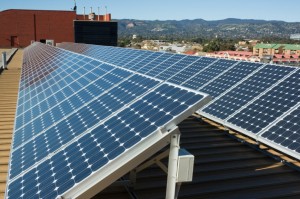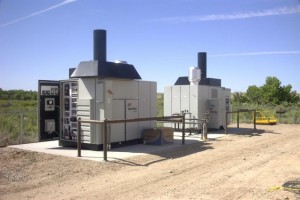 Solar Photovoltaic – Solar panels are made up of photovoltaic cells that harness the power of the sun and can be installed on rooftops, carports and open space. Advantages of solar panels include no moving parts, adaptability to any sun-exposed space, silent operation, no emissions and decades-long panel life.
Solar Photovoltaic – Solar panels are made up of photovoltaic cells that harness the power of the sun and can be installed on rooftops, carports and open space. Advantages of solar panels include no moving parts, adaptability to any sun-exposed space, silent operation, no emissions and decades-long panel life.
Solar Thermal – Solar thermal panels are filled with water and a glycol mixture to capture the concentrated heat produced by the sun’s rays, transferring it through a heat exchanger to the hot water system serving a building. These systems are used extensively around the world. Advantages include adaptability to any sun-exposed space, no emissions, and long panel life.
Wind Turbines – Wind turbines harness the power of the wind to drive electric generators. Advantages include quiet operation and a visible display of clean power commitment when sited on rooftops, parking lot poles and other open space areas.
Fuel Cell – Fuel cells use an electrochemical process to convert the hydrogen in natural gas to electricity. Some units are suitable for CHP projects, similar to turbines and microturbines. Advantages include small space requirements, very low emissions, exemptions from air permits in some areas, and no moving parts.
 Microturbines – Microturbines burn natural gas to drive high speed turbines, creating both electricity and valuable waste heat. They typically come in modules of varying size that are tailored to building sites and varied power needs. Turbine waste heat, used for cogeneration/combined heat and power (CHP) projects, can be used for creating steam, hot water and chilled water for HVAC systems. Benefits of turbines/microturbines include quiet operation, low maintenance, and operation both inside and outside of buildings.
Microturbines – Microturbines burn natural gas to drive high speed turbines, creating both electricity and valuable waste heat. They typically come in modules of varying size that are tailored to building sites and varied power needs. Turbine waste heat, used for cogeneration/combined heat and power (CHP) projects, can be used for creating steam, hot water and chilled water for HVAC systems. Benefits of turbines/microturbines include quiet operation, low maintenance, and operation both inside and outside of buildings.
Internal Combustion Engine – Internal combustion engines are large piston-driven engines that use natural gas to create electricity and valuable waste heat that can be used for CHP projects. Advantages include low initial cost, mature technology, and a wide range of sizes for varied power needs.


